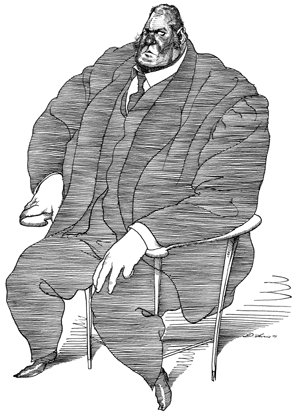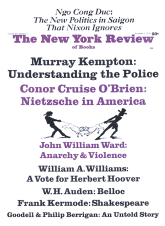If one is interested in an author, one cannot help asking oneself: “Suppose I had to make an anthology from his works, what would I select?” This means, of course, that one will be unfairly prejudiced against any selection which differs from one’s own. In the case of a poet, though different readers may have different preferences, their principle of selection will, I think, be the same: they will try to select what, in their opinion, are his best poems, those, that is, which seem most likely to survive the test of time. Thus, I cannot imagine anyone, when making a selection from Wordsworth, including the sonnet “Spade with which Wilkinson has tilled his lands,” on the grounds that, bad though it is, only Wordsworth could have written it.
But in the case of a man like Belloc, who wrote not only “pure” literature but was also a prolific journalist, a highly polemical writer about history, politics, public affairs, the problem of selection is much more difficult, because one cannot separate the artistic fabricator from the propagandist, the literary man-of-action. In the case of the former, his personality, his foibles, are, or should be, of no concern to the public; in the case of the latter, they are important and significant.
About Belloc the artist, all readers, whatever their religious and political convictions, will agree on two points. Firstly, he is, like Swift, one of the great masters of straightforward English prose. Even when I find what he is saying wrongheaded or absurd, I have to admire how he says it, his clarity, vigor, and elegance; and whenever his subject is one to which dogmas are irrelevant, as when he is describing his experiences as a French conscript, or his adventures among savage mountains and on stormy seas, or his visits to little known cities, I am completely enchanted. Secondly, as a writer of Light Verse, he has few equals and no superiors. (His “serious” poems, like the Sonnets, seem to me bien fait, but without original vision, an imitation of poetry-in-general.)
Since I, personally, am interested in Belloc the literary artist, not in Belloc the polemicist, my own anthology would consist almost entirely of passages from Hills and the Sea, The Path to Rome, The Cruise of the Nona, Many Cities, Cautionary Tales, Peers, and More Peers. I would also certainly include, and here I am most grateful to Mr. van Thal for reprinting it, since I had never read it before, his magnificent Taylorian lecture, On Translation, from which I cannot resist quoting a brief sample.
If you come across the French word “constater,” which in point of fact you do in nearly all official documents with which you may have to deal, you must always replace it by a full English sentence, even so ample as, “We note without further comment,” or “We note for purposes of future reference,” or in another connection, “We desire to put on record.” In the same way there are whole French phrases which should justly be put into a shorter form in English. Take such a sentence as this, “Il y avait dans cet homme je ne sais quoi de suffisance.” The right translation of this would not be: “There is in this man I know not what of self-sufficiency”; the right translation is rather, more briefly, “There was a touch of self-complacency about him.”
I realize, however, that my selection would not realize Mr. van Thal’s objective of giving “representation to the differing facets of the man and his genius.” I can see that, given his aim, it was just and necessary to include an excerpt from Belloc’s book on the Jews, because that race was an important concern in his life. Distasteful as I find it, Belloc was right on one point. The refusal of the educated classes in England to admit publicly that anti-Semitism existed, the wish to sweep the problem under the rug, was not going to make matters any better. Actually, since the readmittance of the Jews under Cromwell, I do not think that anti-Semitism has ever been a serious menace in England. It has always flourished more strongly in Roman Catholic and Greek Orthodox countries than in Protestant ones, partly, perhaps, because Protestants have always been devoted, some might say addicted, to the Old Testament. Hitler, it should be remembered, was an Austrian, not a Prussian.
At times, however, I feel that, in his wish to be fully representative, Mr. van Thal goes a bit too far. Was it really kind to Belloc’s memory to reprint such pieces as “Advice to the Rich,” which reads like a malicious parody, or A Chinese Litany of Numbers, a series of lists which are neither witty nor profound and could have been assembled by a computer, or the brief note to Compton Mackenzie, which only reveals that, like his friend Chesterton, Belloc knew nothing whatsoever about music? (No one who did could have spoken of “the love-song in Don Juan.”)
Advertisement
But in general Mr. van Thal has done what must have been an extremely difficult task very well. For example, in representing Belloc the historian, he has wisely concentrated upon his pen-portraits of historical characters, because it is almost impossible to make excerpts from historical narrative without falsifying it. Besides, Belloc was very good at pen-portraits, and they are usually free from bias in the way that his narratives are not. Moreover, he sometimes sees things about his characters which previous historians had missed. I am sure, for example, he is right when he says that Robespierre was not, as popular legend believed him to be, the real power in the Committee of Public Safety, that the real power was Carnot.
Though I am quite certain he was wrong in believing that, but for Henry VIII’s marriage to Anne Boleyn, England would have remained Catholic—I am sure she would have become Protestant within a generation—his portrait of Anne herself is very fair. Even more remarkably, so is his portrait of Cromwell.
(Incidentally, it has always struck me as extremely odd and significant that the lands which became Protestant at the Reformation were precisely those which had been least influenced by the culture of pagan Rome. England, it is true, lay inside the limes, but the Roman influence there seems to have been superficial. It is also true that Ireland lay outside them, but there, because of political circumstances, Catholicism was the chief, perhaps the only, means of maintaining a sense of national identity.)
Again, Mr. van Thal has evidently sensed that, if one wants to understand a man’s ideas about history and politics, particularly if they are controversial, one has to view them in the context of his time and society. By what other thinkers was he influenced? Whom did he consider the Enemy and what, precisely, did the Enemy think? To understand Belloc, for example, one must know something about the Whig version of English history which had dominated the nineteenth century. But this, by its nature, an anthology devoted to a single author cannot do.
All in all, then, despite some reservations, I think Belloc a fascinating compilation. One last picayune complaint. The first two lines of “Lord Finchley” are printed wrong.
Lord Finchley tried to mend the Electric Light Himself. It struck him dead: and serve him right.
should run:
Lord Finchley tried to mend the Electric Light
Himself. It struck him dead: and serve him right!
This Issue
November 5, 1970




